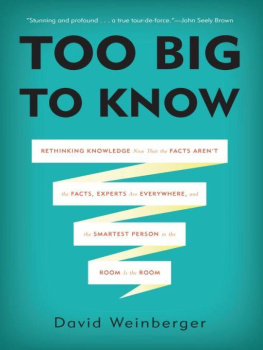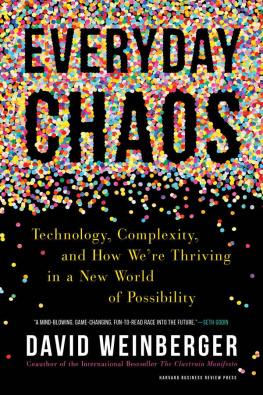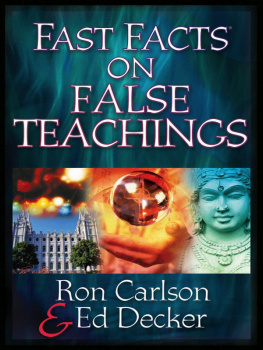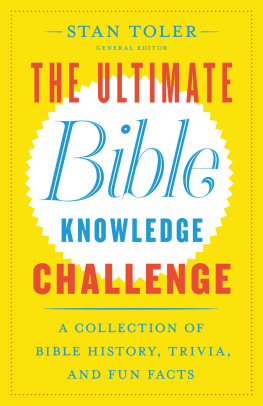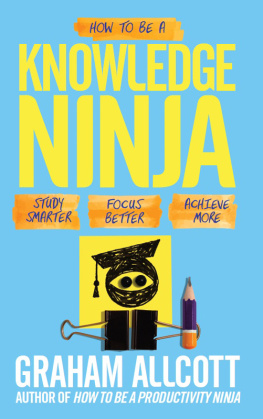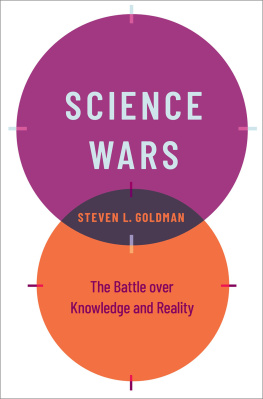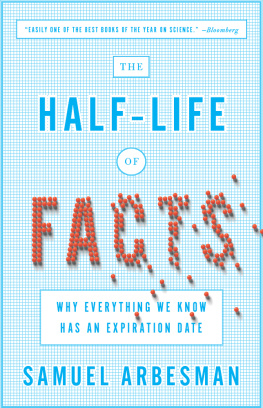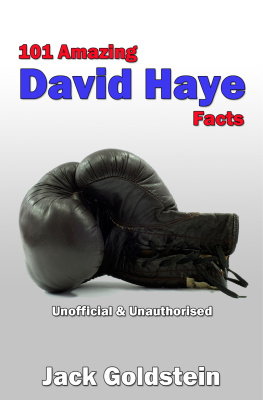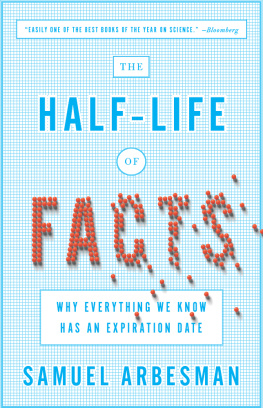Table of Contents
ALSO BY DAVID WEINBERGER
Everything Is Miscellaneous
Small Pieces Loosely Joined
The Cluetrain Manifesto
(with Rick Levine, Christopher Locke, and Doc Searls)
PROLOGUE
The Crisis of Knowledge
THREE OF THE SIX HEADLINES on the front page of the New York Times on the day I happen to be writing this (June 21, 2010) could have as their subhead Knowledge in Crisis!
The lead story on this randomly chosen day at The Paper of Record takes a long look at the reasons behind the failure of the supposed fail-safe mechanism on the British Petroleum oil rig that fouled the Gulf of Mexico. The five authors explain clearly what a blind shear ram is (two tough blades... poised to slice through the drill pipe, seal the well and save the day), how close it came to working, and what exactly went wrong. The article bounces us from vivid descriptions of the moments when the equipment proved inadequate, to an extensive examination of the claims made by the oil industry, to a discussion of the internal processes of a lax regulatory agency. The articles controversial upshot: Fail-safe mechanisms sound reassuring but in actuality create a terrifyingly risky single point of failure.
The subject of the article may be the BP oil spill, but its real topic is the limits of expert knowledge in tackling complex problems. It attempts to explain what we could have done to prevent the disaster, given how hard it is for us to know what will work. How wide is the inevitable gap between our perfect theories and their mechanical imperfection? How much of what we know depends on what we would like to believe? What are the institutional biases that prevent us from acting on what we know? Can the forces that corrupt knowledge be countered, or should we recognize that knowledge is always going to be degraded by politics and greed?
Below this front-page article is a preliminary investigation of John Updikes archive, suggesting that the author researched the settings of his novels with a great concern for accuracydown to the sales figures for Toyota franchises and the look of Florida license plates. The archive reveals rich details about the private life of a writer who carefully controlled the public view of himselfa one-man gated community, the article saysbut who seems to have prepared for an open house once he died, preserving correspondence and even recording the grades he got on quizzes as an undergraduate at Harvard. The Updike revealed by the archives is at some variance with the Updike we thought we knew. For example, though he encouraged a reputation for revising little, the archives he carefully preserved show that he meticulously reworked his manuscripts.
The story is about John Updike, but it raises the important question of how we are going to understand artists once they no longer leave paper trails. Its the paper that Updike collected and preserved that lets us see how much of his fiction is indebted to researching the facts that populate his characters world. And its the paper with Updikes penciled markings that allows us to see the effort behind his effortless prose. What will we be able to know about writers whose drafts and markings vanish in a flow of insubstantial bits? Without such a record, how will we be able to observe, as the Times article does, that Updikes early letters pay scant attention to the Korean War and McCarthyism? How will we know that which can be learned only by observing what is not mentioned if personal archives become as fragile as the magnetic traces on an aging hard drive?
At the bottom of the front page of this particular edition of the Times is a feature about soccer players in the World Cup who fake injury to draw a free kick. The article notes that it would be much easier to nab these actors if the referees had access to video replays, but that would require sacrificing the flow and spontaneity of the sporta political and cultural change that the International Federation of Association Football is reluctant to make.
We could read this as a sports story, of course, but it is also about the complex role that knowledge plays in our world. How much does accuracy matter? How much are we willing to let experts intrude in order to get a better ruling? What are the positive aspects of the fallibility of human knowledge? Do we want to let experts swarm onto every literal and figurative field? Doesnt expertise come with a cost? Does there turn out to be a benefit to letting events have blurry edges of ignorance?
These three newspaper articles from different realms of life are part of a long argument weve been having about knowledge over the roughly 2,500 years since we decided it would be useful to distinguish reliable ideas from mere opinions. Despite the constant disputes, the basics of our system of knowledge are quite well defined. Especially for those who have grown up digital, heres a reminder of how it works:
People study hard and become experts in particular areas. They earn credentialsdegrees, publications, the occasional Nobel Prizethat make it easier for us trust them. They write books, teach classes, and go on TV, so that we all can benefit from their hard work. The results of that work go through vetting processes appropriate to the type and importance of its claims, providing us with even more assurance of its accuracy. As new discoveries are made and sanctioned, the body of knowledge grows. We build on it, engaging in a multi-generational project that, albeit with occasional missteps, leads us further along in our understanding of the world. Knowledge is a treasure, knowing is the distinctively human activity, and our system of knowledge is the basis for the hope that we might all one day come to agreement and live in peace.
Weve grown up thinking that this is how knowledge works. But as the digital age is revealing, thats how knowledge worked when its medium was paper. Transform the medium by which we develop, preserve, and communicate knowledge, and we transform knowledge.
Within those three front-page New York Times stories we can already discern challenges to some of our most basic ideas about what knowledge is and how it works:
In the three months before it was finally capped, BPs gushing oil could be seen live on any Web site that cared to embed the video, surrounded by whatever text and links the pages owner thought important to understand it. The online version of the New York Times article linked to its source data, including previously unreleased notes scrawled by industry crisis managers, in case we wanted to become our own experts over the course of breakfast. Every blogger is a broadcaster, and every reader is an editor.
Updikes archive may be the last great paper trail, as the article says, and every reader who uses a word processoror, as most of us say these days, who writescontrasts the solid traces we used to leave behind with the digital dust we currently leave in our wake: more of it for sure, but also more likely to be blown away by a hard-drive failure or a change from floppies to CDs to DVDs to Blu-Rays to whatever comes next and next after that. A paper archive like Updikes seems so quaint these daysso manageable in size, so under the control of the person who is its subject. What are people going to know about us when they are left to rake through the acres of drafts and photos weve strewn across our hard drives and Facebook pages?
Every spectator of the World Cup can see the replays that the referees cannot, making the lively online discussion among soccer fans more fact-based and knowledgeable than the decisions of the expert judges on the field.

